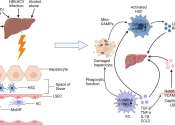Genetically engineering a treatment for incurable brain tumors
Purdue University researchers are developing and validating a patent-pending treatment for incurable glioblastoma brain tumors. Glioblastomas are almost always lethal with a median survival time of 14 months. Traditional ...
Apr 22, 2024
0
29


